-
RESEARCH01-01-2018
Contribution of academic tutoring for the teaching-learning process in Nursing undergraduate studies
Revista Brasileira de Enfermagem. 2018;71:1596-1603
Abstract
RESEARCHContribution of academic tutoring for the teaching-learning process in Nursing undergraduate studies
Revista Brasileira de Enfermagem. 2018;71:1596-1603
DOI 10.1590/0034-7167-2017-0736
Views0See moreABSTRACT
Objective:
to analyze the perceptions of professors and students on academic tutoring.
Method:
descriptive study with a qualitative approach, carried out at the Magalhães Barata School of Nursing, State University of Pará, Brazil. Twenty-seven professors and 32 students participated in the study. Data were collected through semi-structured and individual interviews, using different scripts for professors and students. For analysis, the technique of content analysis was used.
Results:
we defined three thematic categories: academic tutoring as a tool for strengthening teaching-learning; academic tutoring as a possibility of intellectual and social transformation; and reflections of academic tutoring in nurses’ training.
Final considerations:
the teaching-learning process is referred to as a process in which there must be dialogue, and in which professors, students, and tutors learn with each other, breaking the traditional paradigms of unilateral and vertical transfer of content. Academic tutoring stands out as promoter and strengthener of this process.
-
RESEARCH01-01-2018
Knowledge about precautions in Primary Health Care: tool validation
Revista Brasileira de Enfermagem. 2018;71:1589-1595
Abstract
RESEARCHKnowledge about precautions in Primary Health Care: tool validation
Revista Brasileira de Enfermagem. 2018;71:1589-1595
DOI 10.1590/0034-7167-2017-0886
Views0See moreABSTRACT
Objective:
To elaborate and validate a tool to assess knowledge and behavior of nursing professionals about standards and specific precautions in the Primary Health Care.
Method:
Methodological study of the elaboration and validation of the tool by thirteen experts judges, using a Likert scale of 4 points, with Content Validity Index ≥ 0.80, on clarity, relevance and pertinence.
Results:
A tool composed of 47 dichotomous questions to assess knowledge and 12 questions, with five options of answers, for the referred behavior. In the validation, only one item was deleted, related to the “Hands Hygiene” axis and one item was reformulated, regarding “Use of Common Gloves” and another 11 changed writing. The tool as a whole was assessed for relevance, comprehensiveness and representativeness within the scope of the topic investigated.
Conclusion:
The developed tool has been validated and is now available for use in Primary Health Care.
-
RESEARCH01-01-2018
Rethinking the Health Care Model through the reorientation of training
Revista Brasileira de Enfermagem. 2018;71:1580-1588
Abstract
RESEARCHRethinking the Health Care Model through the reorientation of training
Revista Brasileira de Enfermagem. 2018;71:1580-1588
DOI 10.1590/0034-7167-2017-0055
Views0See moreABSTRACT
Objective:
to understand the contributions of the National Program of Reorientation of Professional Training in Health (Pró-Saúde) for the change in the model of care and training of health professionals.
Methods:
a case study with representatives of the teaching, care, management and social control, participants of the management units of the Pró-Saúde (Charitable institution for social and hospital assistance), in a municipality of the south of Brazil. Data collection took place through interviews and observations between October 2012 and February 2013.
Results:
the Program acts as a device for the transition of health care and training models, by promoting the problematization of daily work and the approximation between teaching and service. Emphasis is placed on the importance of the subjects’ commitment and the different perspectives on the community.
Conclusion:
Pró-Saúde leaves visible marks in the process of qualifying students and professionals, as well as promoting collaborative action in the fields of management, care, teaching and social control in the SUS (Brazilian Unified Health System).
-
RESEARCH01-01-2018
Critical incidents involving Semiology during practical activities of nursing undergraduates
Revista Brasileira de Enfermagem. 2018;71:1572-1579
Abstract
RESEARCHCritical incidents involving Semiology during practical activities of nursing undergraduates
Revista Brasileira de Enfermagem. 2018;71:1572-1579
DOI 10.1590/0034-7167-2017-0364
Views0See moreABSTRACT
Objective:
To identify critical incidents (situations, behaviors and feelings) during practical activities, involving knowledge and skills related to the discipline of Semiology and Semiotics.
Method:
Descriptive research using the critical incident technique, with the Snow Ball technique for the selection of participants and an instrument for collection of data. The reports were categorized according to the elements of the critical incident (situations, behaviors and feelings).
Results:
A total of 62 reports from senior (n = 46), sophomore and junior (n = 16) students were analyzed. The students were predominantly female (90.3%). The majority described a situation of a physical examination, expressed mastery of the skills necessary for the activity and reported positive feelings.
Conclusion:
The reports showed that the knowledge and skills acquired in the discipline allowed for a development of practical activities with familiarity and positive feelings. The importance that the students attribute to the recognition of the activities by the professor, the patient and family stands out.
-
01-01-2018
ERRATA
Revista Brasileira de Enfermagem. 2018;71:1569-1569
Abstract
ERRATA
Revista Brasileira de Enfermagem. 2018;71:1569-1569
DOI 10.1590/0034-7167.201871suppl3e01
Views0No artigo “Idoso e demanda de cuidador: proposta de classificação da necessidade de cuidado”, com número de DOI: , publicado no periódico Revista Brasileira de Enfermagem, v71(suppl 2):897-904, na página 901, na Figura 3:Onde se via:[…]See more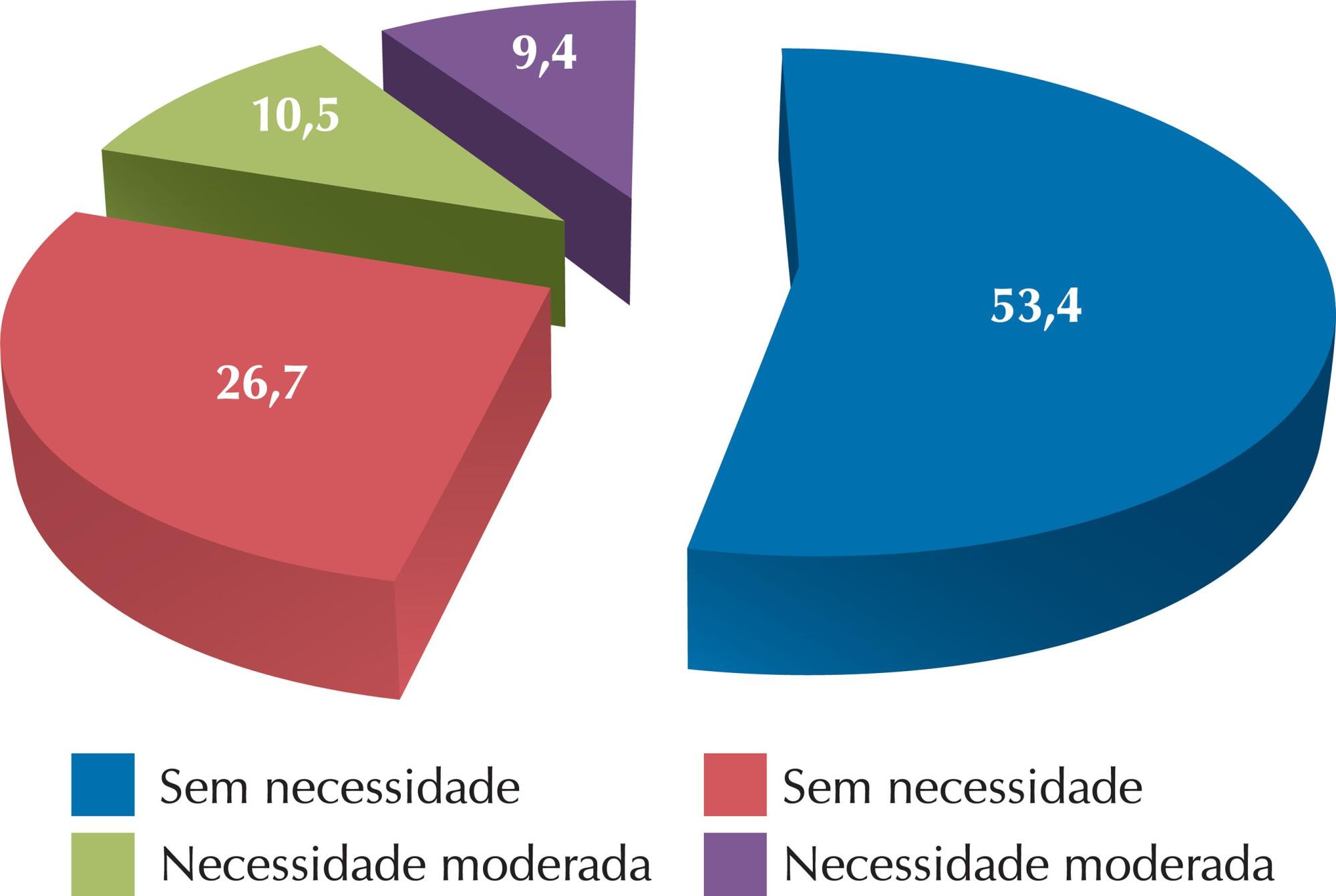
-
RESEARCH01-01-2018
Nurses’ knowledge and competencies for preceptorship in the basic health unit
Revista Brasileira de Enfermagem. 2018;71:1564-1571
Abstract
RESEARCHNurses’ knowledge and competencies for preceptorship in the basic health unit
Revista Brasileira de Enfermagem. 2018;71:1564-1571
DOI 10.1590/0034-7167-2016-0533
Views0See moreABSTRACT
Objective:
to describe the actions performed by nurses in the preceptorship of students in the Basic Health Unit (Portuguese acronym: UBS); to identify the knowledge of nurses and competencies they need to acquire or develop in order to act in the preceptorship of students in the UBS; to discuss the implications of the pedagogical practice of preceptor nurses in their own continuing education.
Method:
qualitative, descriptive and exploratory nature. Scenario: A UBS. Participants: six preceptor nurses. Data collection: semi-structured interview.
Results:
Bardin’s content analysis was used. Emerging categories: Approaching the concept of preceptor and the teaching role; The fragile institutional recognition of UBS as a field of internship and the offer of knowledge of preceptors: overcoming difficulties; Preceptor nurses’ performance in face of dynamics of facts arising and shaping the reality in a UBS; Opportunities and limitations of the pedagogical practice implying on continuing education.
Conclusion:
it is necessary to discuss and rethink the strategies of interest of preceptors and develop their competencies.
-
RESEARCH01-01-2018
The nurse training in research in the undergraduate education: teaching perceptions
Revista Brasileira de Enfermagem. 2018;71:1556-1563
Abstract
RESEARCHThe nurse training in research in the undergraduate education: teaching perceptions
Revista Brasileira de Enfermagem. 2018;71:1556-1563
DOI 10.1590/0034-7167-2017-0511
Views0See moreABSTRACT
Objective:
To analyze how the approach of the theme “scientific investigation” can contribute to the development of the scientific competence of the Nursing student.
Method:
A descriptive-exploratory, case-study, qualitative study was carried out with professors from a public university in the South of Brazil. Data were collected through a semi-structured individual interview and a group interview, called the conversation circle.
Results:
Data analysis consisted of three categories: “Research as a structuring theme and scientific principle in undergraduate student training in Nursing”; “Research as a structuring theme and scientific principle in undergraduate student training in Nursing”; “Sap research and educational principle in the integrated curriculum”.
Conclusion:
Research training can occur at all undergraduate academic moments, providing the student with the knowledge of scientific research as a formative content and as an investigative attitude, in order to enable the development of scientific competence in professional practice.
-
RESEARCH01-01-2018
Clothing and professional identity in the training of nurses in the city of Juiz de Fora
Revista Brasileira de Enfermagem. 2018;71:1548-1555
Abstract
RESEARCHClothing and professional identity in the training of nurses in the city of Juiz de Fora
Revista Brasileira de Enfermagem. 2018;71:1548-1555
DOI 10.1590/0034-7167-2017-0522
Views0See moreABSTRACT
Objective:
To understand the meaning of the transformations that occurred in the clothing of EEHB students and their role in the construction of a professional identity of nurses in Juiz de Fora.
Method:
Historical and social qualitative study from 1965 to 1978. Oral and written sources were used. Oral sources were produced with the Thematic Oral History technique, with 10 collaborators. The theoretical frameworks used were the concepts of identity of Claude Dubar, and concepts of clothing and their symbolic meanings of Roland Barthes.
Results:
The EEHB nursing students’ uniform represented a brand, an essential symbol in the construction and consolidation of the nurse’s identity in the city of Juiz de Fora.
Conclusion:
The uniform was recognized as an object of identification of nurses in the city, giving them a social image of credibility for their training.
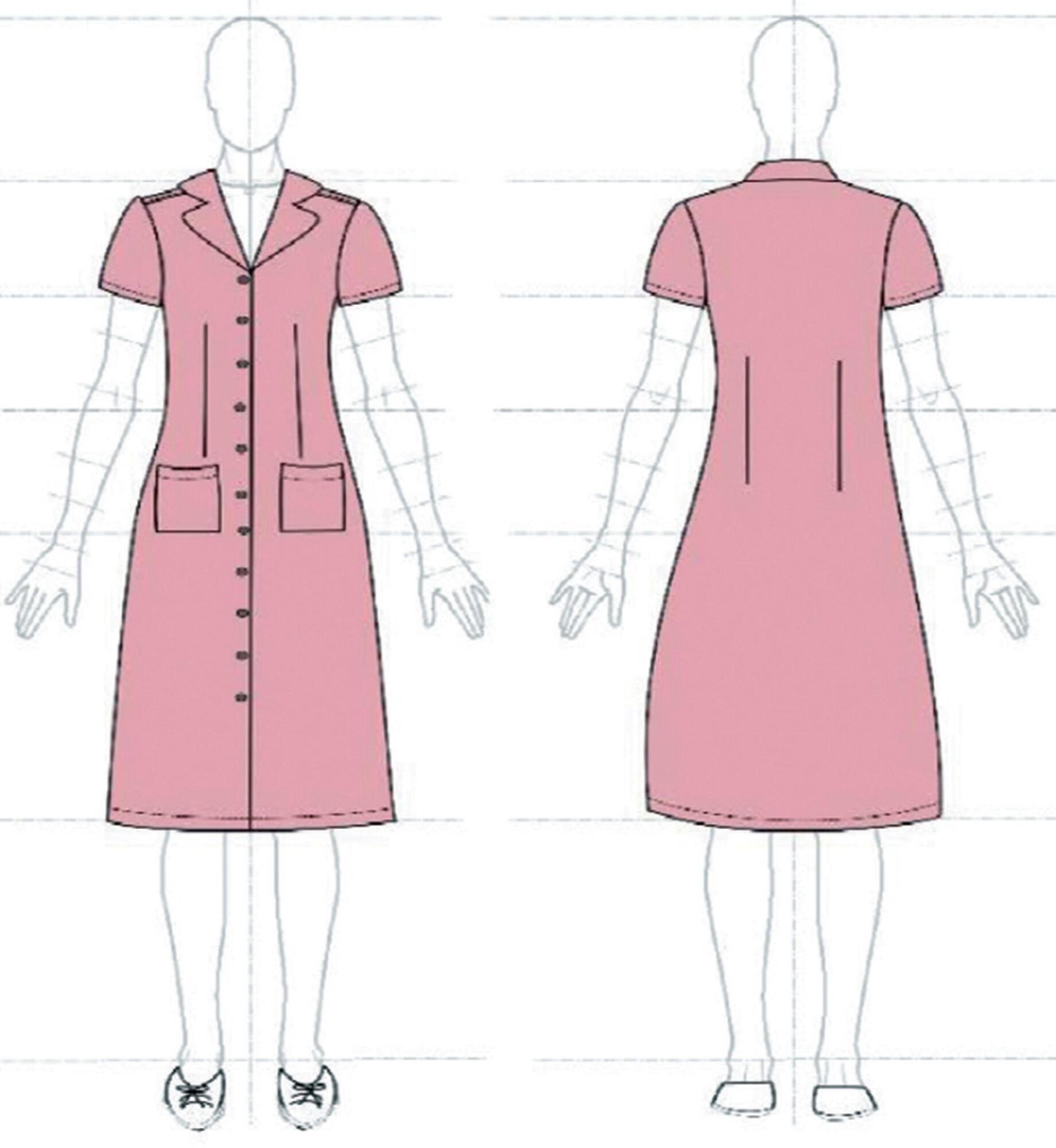
-
ORIGINAL ARTICLE09-09-2022
Palliative care management by caregivers in home care: theoretical validation in a conversation circle
Revista Brasileira de Enfermagem. 2022;75(6):e20210737
Abstract
ORIGINAL ARTICLEPalliative care management by caregivers in home care: theoretical validation in a conversation circle
Revista Brasileira de Enfermagem. 2022;75(6):e20210737
DOI 10.1590/0034-7167-2021-0737
Views0See moreABSTRACT
Objectives:
to present the validation process of a Grounded Theory on the management of palliative care at home by a caregiver of a family member who experiences a death/dying process.
Methods:
a qualitative, explanatory research, which validated a theoretical matrix through a conversation circle containing 15 family caregivers and nine healthcare professionals, in December 2018.
Results:
forty-six propositions were validated regarding family caregivers’ contextual, causal, intervening conditions, consequences and action strategies to deal with the dying and death process of a family member. Conversation circles encouraged dialogue and (re)signification of the senses and knowledge of those involved, proving to be a way of educating and promoting the exercise of citizenship by participants.
Final Considerations:
the conversation circle made it possible for participants to interact and share information and experiences regarding home care for palliative patients and their families.

-
EXPERIENCE REPORT06-24-2022
Step-by-step approach to reopening a Brazilian higher education institution during the COVID-19 pandemic
Revista Brasileira de Enfermagem. 2022;75(6):e20210807
Abstract
EXPERIENCE REPORTStep-by-step approach to reopening a Brazilian higher education institution during the COVID-19 pandemic
Revista Brasileira de Enfermagem. 2022;75(6):e20210807
DOI 10.1590/0034-7167-2021-0807
Views0See moreABSTRACT
Objectives:
to describe the experience of reopening a Brazilian higher education institution during the COVID-19 pandemic.
Methods:
experience report of a step-by-set approach to reopening a nursing higher education institution in São Paulo, Brazil, from May 2020 to May 2021.
Results:
the plan was created and operated by a group including students, professors, and technical-administrative workers. Weekly or by-weekly meetings occurred according to changes in the epidemiological situation and the needs to review the local technical and political agreements.
Conclusions:
we suggest that reopening plans during the COVID-19 pandemic should be politically and technically legitimated by all members of the community of a higher education institution so that they can take place quickly and sustainably. The early identification of COVID-19 cases and the adoption of local administrative measures are necessary to reduce the risk of outbreaks.

-
ORIGINAL ARTICLE10-03-2022
Instrument validity: HIV and other sexually transmitted infections in homeless people
Revista Brasileira de Enfermagem. 2022;75(6):e20210863
Abstract
ORIGINAL ARTICLEInstrument validity: HIV and other sexually transmitted infections in homeless people
Revista Brasileira de Enfermagem. 2022;75(6):e20210863
DOI 10.1590/0034-7167-2021-0863
Views0See moreABSTRACT
Objectives:
to validate, through the Item Response Theory, an instrument on vulnerability to HIV and other sexually transmitted infections in homeless people.
Methods:
a cross-sectional study carried out between February and May 2018 with 100 homeless people in a municipality in northeastern Brazil. A sociodemographic questionnaire was applied, and another with items referring to behaviors vulnerable to HIV and sexually transmitted infections (STIs). Subsequently, it was assessed through the Item Response Theory.
Results:
the items previous diagnosis of STIs (F=0.473), partner with STI symptoms (F=0.518), drug use (F=0.509), sex for money (F=0.552), STI symptoms (F=0.448), number of sexual partners (F=0.616), sharps sharing (F=0.398) and being a victim of sexual violence (F=0.347) were validated.
Conclusions:
the instrument proved to be validated, being able to identify vulnerability to HIV and other sexually transmitted infections in homeless people.

-
ORIGINAL ARTICLE08-22-2022
Temporal trend of accidents due to percutaneous exposure in a public hospital in Brazil, 2007-2019
Revista Brasileira de Enfermagem. 2022;75(6):e20220046
Abstract
ORIGINAL ARTICLETemporal trend of accidents due to percutaneous exposure in a public hospital in Brazil, 2007-2019
Revista Brasileira de Enfermagem. 2022;75(6):e20220046
DOI 10.1590/0034-7167-2022-0046
Views0See moreABSTRACT
Objectives:
to analyze the temporal trend of accidents due to percutaneous exposure in a public hospital in Brazil, between 2007 and 2019, according to sociodemographic and professional characteristics.
Methods:
analysis of time series of accidents due to percutaneous exposure that occurred in health workers. Sociodemographic and professional variables, accident profile, post-accident behavior and accident incidence rates were evaluated. The Prais Winsten regression was used for trend analysis and calculation of the annual percentage change, with a significance level of 5%.
Results:
761 occupational accidents were recorded. There was a downward trend in the rate of percutaneous injuries among female workers (-0.012%; p=0.009), who had secondary education (-0.011%; p=0.035) and among all health professional categories (-0.010%; p =0.019). There was an increasing trend (0.018%; p= 0.050) among workers with ≥ 61 months of professional experience.
Conclusions:
the analysis showed a decreasing incidence of percutaneous accidents, which can be explained by multiple factors.

-
ORIGINAL ARTICLE11-26-2022
Health beliefs and adherence of the elderly to fall prevention measures: a quasi-experimental study
Revista Brasileira de Enfermagem. 2022;75:e20201190
Abstract
ORIGINAL ARTICLEHealth beliefs and adherence of the elderly to fall prevention measures: a quasi-experimental study
Revista Brasileira de Enfermagem. 2022;75:e20201190
DOI 10.1590/0034-7167-2020-1190
Views0See moreABSTRACT
Objective:
To evaluate the effect of an educational intervention on health beliefs and adherence of elderly people to fall prevention measures.
Methods:
This is a quasi-experimental study, carried out at the Senior Citizens’ Center. Sixty-eight elderly completed the intervention. The intervention consisted of four meetings focused on beliefs about falls and prevention, and the evaluation occurred at baseline and 30 days after completion.
Results:
The elderly were predominantly women (83.82%), with one to four years of schooling (36.76%), with health problems (95.59%), and 48.53% had fallen. There was a significant increase in perceived susceptibility, severity, benefits, barriers, and total health belief score post educational intervention. By adding total to partial adherence, there was a significant increase in the adherence of the elderly to fall prevention measures after the educational intervention.
Conclusion:
Educational intervention was able to improve the beliefs and adherence of the elderly to fall prevention measures.
-
ORIGINAL ARTICLE11-26-2022
Transitional care of nurses to older adults with artificial pacemaker
Revista Brasileira de Enfermagem. 2022;75:e20210192
Abstract
ORIGINAL ARTICLETransitional care of nurses to older adults with artificial pacemaker
Revista Brasileira de Enfermagem. 2022;75:e20210192
DOI 10.1590/0034-7167-2021-0192
Views0See moreABSTRACT
Objective:
to understand how the transitional care of nurses to olde adults with artificial pacemaker occurs.
Method:
a qualitative research, carried out in a philanthropic hospital in the city of Salvador, Bahia, Brazil. Fourteen nurses working in surgical and cardiac inpatient units participated. Data were collected between August and November 2020, through semi-structured interviews, and analyzed using the methodological framework Discourse of the Collective Subject and discussed in the light of Afaf Meleis’ theory of transitions.
Results:
nurses’ incipient knowledge about transitional care was identified. It was observed that the nursing discharge report is a facilitating instrument for transitional care.
Final considerations:
the study pointed out that the transitional care of nurses to older adults with artificial pacemakers does not have a theoretical foundation, reporting as a priority the care with the pacemaker identification card and with the surgical wound.
-
REVIEW02-25-2022
COVID-19 and the occupational stress experienced by health professionals in the hospital context: integrative review
Revista Brasileira de Enfermagem. 2022;75:e20200859
Abstract
REVIEWCOVID-19 and the occupational stress experienced by health professionals in the hospital context: integrative review
Revista Brasileira de Enfermagem. 2022;75:e20200859
DOI 10.1590/0034-7167-2020-0859
Views1See moreABSTRACT
Objective:
To analyze Brazilian and international scientific publications about the stress experienced by health professionals in the hospital context during the COVID-19 pandemic.
Methods:
Integrative literature review carried out on the SciELO, ScienceDirect, and LILACS databases, and sources of official Brazilian institutions, with documents published by May 2020.
Results:
Of the 26 selected references, 19 (73.08%) were indexed articles, and 7 (26.92 %) were obtained from official institutions. The study found that stress is mainly due to the overload of hospital services, the removal of professionals, the insufficiency of personal protective equipment and strict biosecurity measures, challenges in the allocation of available resources, and the risk of contamination by COVID-19.
Final considerations:
The stress experienced by health professionals in hospital institutions during the pandemic can trigger occupational and psychological problems.

-
ORIGINAL ARTICLE09-29-2022
Neither angels nor heroes: nurse speeches during the COVID-19 pandemic from a Foucauldian perspective
Revista Brasileira de Enfermagem. 2022;75:e20201329
Abstract
ORIGINAL ARTICLENeither angels nor heroes: nurse speeches during the COVID-19 pandemic from a Foucauldian perspective
Revista Brasileira de Enfermagem. 2022;75:e20201329
DOI 10.1590/0034-7167-2020-1329
Views1See moreABSTRACT
Objective:
to analyze the processes of meaning production, based on the speeches of nursing professionals, about how they feel about the titles of “angels and heroes” given by society during the pandemic of COVID-19.
Methods:
a qualitative, documentary research. Data was collected in October and November 2020 and analyzed from the perspective of the Discourse Analysis proposed by Michel Foucault.
Results:
they were organized into two thematic categories: “Angels and heroes? The (not) heroic reality of nursing during the pandemic” and “The search for recognition of the professional work of nursing: between what is said and what is not said”.
Final considerations:
the nurses’ speeches enunciate the search for decent conditions for the execution of care, fair wages, and recognition of the professional work by society.
-
ORIGINAL ARTICLE07-15-2020
Spatial analysis of inequalities in fetal and infant mortality due to avoidable causes
Revista Brasileira de Enfermagem. 2020;73:e20190088
Abstract
ORIGINAL ARTICLESpatial analysis of inequalities in fetal and infant mortality due to avoidable causes
Revista Brasileira de Enfermagem. 2020;73:e20190088
DOI 10.1590/0034-7167-2019-0088
Views0See moreABSTRACT
Objectives:
to analyze social inequalities in spatial distribution of fetal and infant mortality by avoidable causes and identify the areas of greater risk of occurrence.
Methods:
avoidable deaths of fetal and infant residents of Recife/Brazil were studied. The rates of avoidable fetal and infant mortality were calculated for two five-year periods, 2006-2010 and 2011-2015. The scan statistics was used for spatial analysis and related to the social deprivation index.
Results:
out of the total 2,210 fetal deaths, 80% were preventable. Avoidable fetal mortality rates increased by 8.1% in the five-year periods. Of the 2,846 infant deaths, 74% were avoidable, and the infant mortality rate reduced by 0.13%.
Conclusions:
in the spatial analysis, were identified clusters with higher risk for deaths. The social deprivation index showed sensibility with areas of worse living conditions.
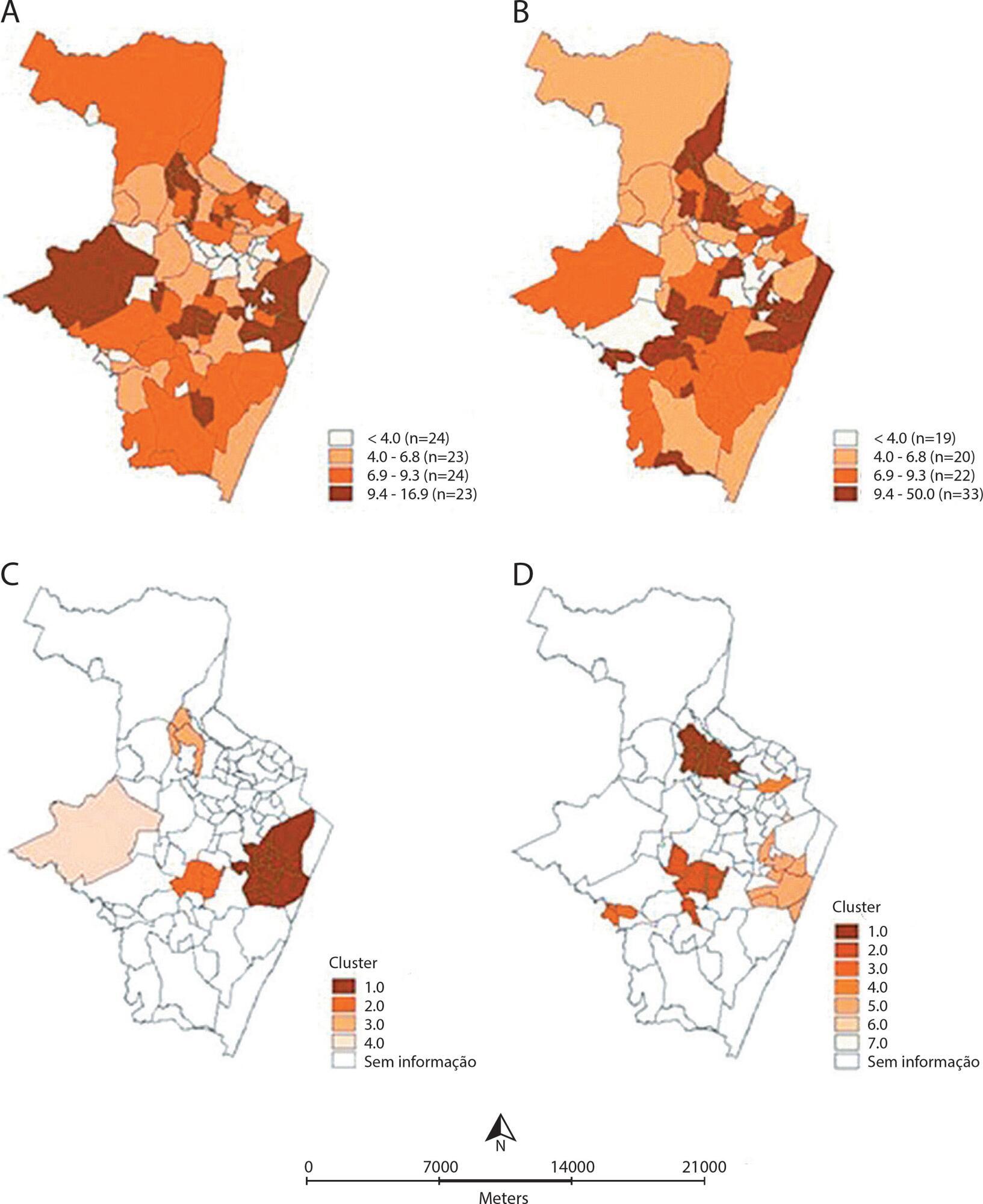
-
ORIGINAL ARTICLE10-21-2019
Evaluation of the performance of the modified early warning score in a Brazilian public hospital
Revista Brasileira de Enfermagem. 2019;72(6):1428-1434
Abstract
ORIGINAL ARTICLEEvaluation of the performance of the modified early warning score in a Brazilian public hospital
Revista Brasileira de Enfermagem. 2019;72(6):1428-1434
DOI 10.1590/0034-7167-2017-0537
Views0See moreABSTRACT
Objective:
To evaluate the performance of the modified early warning score (Mews) in a nursing ward for patients in clinical deterioration.
Method:
This is an analytical, quantitative and predictive study. Mews’ parameters (systolic blood pressure, heart rate, respiratory rate, temperature and level of consciousness) were evaluated every six hours. The following events were reported: death, cardiopulmonary arrest and transfer to intensive care. The evaluations were performed in a hospital of reference in the state of São Paulo, Brazil.
Results:
A total of 300 patients were included (57 ± 18 years old, males: 65%). There number of combined events was observed to be greater the higher the score’s value (00%; 00%; 01; 09%; 19%; 28%; 89%, respectively, for Mews 0; 1; 2; 3; 4; 5 and 6; p < 0.0001). Mews ≥ 4 was the most appropriate cut-off point for prediction of these events (sensitivity: 87%, specificity: 85% and accuracy: 0.86).
Conclusion:
Mews properly measured the occurrence of severe events in hospitalized patients of a Brazilian public hospital’s nursing ward. Mews ≥ 4 seems to be the most appropriate cut-off point for prediction of these events.
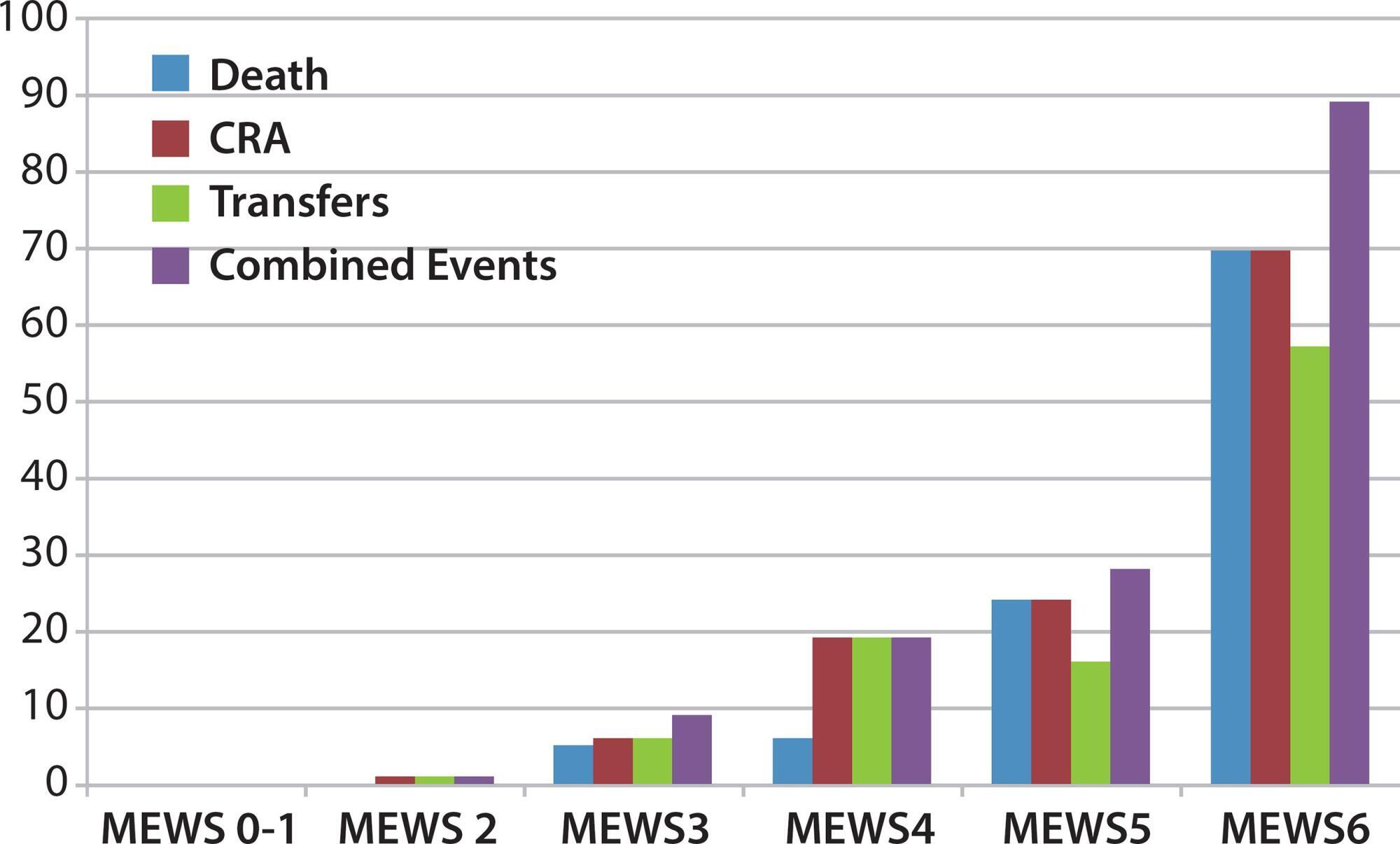
-
ORIGINAL ARTICLE10-18-2022
Nursing professionals’ biosafety in confronting COVID-19
Revista Brasileira de Enfermagem. 2022;75:e20201104
Abstract
ORIGINAL ARTICLENursing professionals’ biosafety in confronting COVID-19
Revista Brasileira de Enfermagem. 2022;75:e20201104
DOI 10.1590/0034-7167-2020-1104
Views0See moreABSTRACT
Objective:
To investigate the nursing professionals’ biosecurity in confronting COVID-19.
Methods:
This is a Survey type study. Nursing professionals were invited via messaging apps, using self-applied data collection forms. The sample selection (n=693) was non-probabilistic. A descriptive data analysis was conducted.
Results:
considering the biosafety aspects in facing COVID-19, 79.0% of the participants had not received training or considered it insufficient, 69.3% reported the lack of personal protective equipment during work, and 81.8% did not feel safe with the internal flux adaptations for handling COVID-19 cases.
Conclusion:
Continuous and effective nursing team training and personal protective equipment availability are necessary, as well as internal flow adjustments for attending suspected or confirmed cases.
-
ORIGINAL ARTICLE07-08-2020
The association between knowledge about HIV and risk factors in young Amazon people
Revista Brasileira de Enfermagem. 2020;73(5):e20190453
Abstract
ORIGINAL ARTICLEThe association between knowledge about HIV and risk factors in young Amazon people
Revista Brasileira de Enfermagem. 2020;73(5):e20190453
DOI 10.1590/0034-7167-2019-0453
Views0See moreABSTRACT
Objectives:
analyze the association between the level of HIV knowledge among young people from Amazonas region, their sociodemographic profile and infection risk factors.
Methods:
cross-sectional analytical study, which used a structured questionnaire containing questions about sociodemographic, behavioral aspects and HIV knowledge. Data were grouped by sex and underwent ordinal and binary logistic regression analysis.
Results:
the students had an HIV knowledge deficit, associated with a low educational level of their parents and low family income. The most frequent risk factors were lack of knowledge on the part of female students regarding proper male condom use, their infrequent use in sexual relations and failure to do HIV testing. There was an association between level of knowledge and use of dating apps by female students.
Conclusions:
there was no association between level of knowledge and the preponderant risk factors, but the students’ knowledge deficit rendered them more vulnerable to infection.
-
REVIEW03-07-2022
Gender violence perpetrated against trans women
Revista Brasileira de Enfermagem. 2022;75:e20210173
Abstract
REVIEWGender violence perpetrated against trans women
Revista Brasileira de Enfermagem. 2022;75:e20210173
DOI 10.1590/0034-7167-2021-0173
Views0See moreABSTRACT
Objectives:
to identify scientific evidence on gender violence perpetrated against trans women.
Methods:
integrative review, carried out in June 2020, without time frame, in the Scopus, MEDLINE, Embase, CINAHL, WoS, PsycInfo and LILACS databases. The controlled descriptors of DeCS, MeSH and their entry terms were used: “Transgender People”, “Transgender”, “Gender Identity”, “Transsexuality”, “Gender Violence”, “Aggression”, “Sexual Offenses”, “Rape”, “Violence”, “Domestic Violence”. The presentation and synthesis of the results were presented in the PRISMA-2009 flowchart.
Results:
the final sample, consisting of 16 articles, identified different types of violence (sexual, physical, verbal, psychological and financial), perpetrated by family members, strangers, police officers, intimate partners, health professionals, acquaintances, or friends.
Conclusions:
trans women suffer violence and social exclusion that result from stigma and discrimination due to gender identity and result in unrestricted damage to physical health.
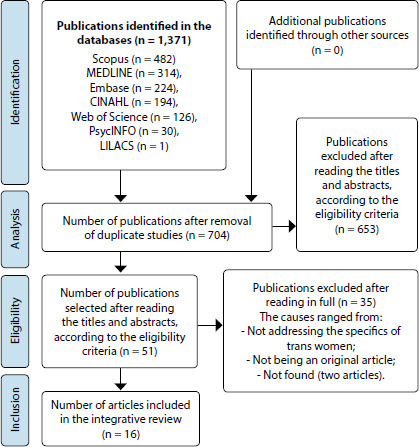
-
ORIGINAL ARTICLE11-29-2022
Changes implemented in the work environment of nurses in the COVID-19 pandemic
Revista Brasileira de Enfermagem. 2022;75:e20201381
Abstract
ORIGINAL ARTICLEChanges implemented in the work environment of nurses in the COVID-19 pandemic
Revista Brasileira de Enfermagem. 2022;75:e20201381
DOI 10.1590/0034-7167-2020-1381
Views0See moreABSTRACT
Objective:
to describe the changes implemented in the work environment of nurses in university hospitals considering the COVID-19 pandemic.
Methods:
this qualitative and descriptive research was developed from an online survey with 75 nurses from three Brazilian university hospitals. Data processing occurred through textual analysis with the aid of software IRAMUTEQ.
Results:
five semantic classes were obtained: Organization of units for exclusive care of patients with COVID-19; Adaptations in the use of personal protective equipment; Physical structure adaptation; Care flow institution; Increased number of beds and training courses. Final considerations: the results show the effort of healthcare and nursing professionals/managers in the development of structural adaptations and reorganizations of care processes, in the hospital context, to respond with quality and efficiency to the demands arising from the COVID-19 pandemic.
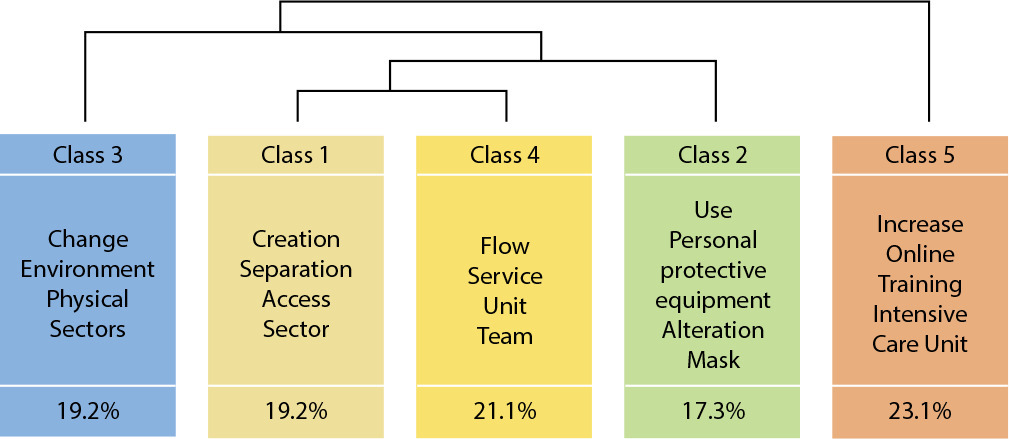
-
ORIGINAL ARTICLE03-07-2022
Women’s perception of labor and birth care: obstacles to humanization
Revista Brasileira de Enfermagem. 2022;75:e20210215
Abstract
ORIGINAL ARTICLEWomen’s perception of labor and birth care: obstacles to humanization
Revista Brasileira de Enfermagem. 2022;75:e20210215
DOI 10.1590/0034-7167-2021-0215
Views0See moreABSTRACT
Objectives:
to understand women’s perception regarding the care received during labor and birth.
Methods:
this is a descriptive-exploratory, qualitative study carried out with 54 postpartum women from hospitals in the Metropolitan Region II of the state of Rio de Janeiro, from January to December 2018, using semi-structured interviews submitted to content analysis.
Results:
puerperal women’s perceptions about the childbirth care they received indicated the use of interventions, such as pressure maneuvers on the uterine fundus during the expulsion period – Kristeller maneuver, episiotomy and repeated vaginal examination and without consent. The use of institutional routines, such as zero diet, horizontal birth and disrespect.
Final Considerations:
despite the encouragement of public humanization policies, the technocratic model is still present in obstetric care during childbirth. The humanization of obstetric care requires changes in attitudes and care paradigms, in order to guarantee respect and the right to quality care.
-
ORIGINAL ARTICLE10-21-2019
Permanent education for good practices in the prevention of pressure injury: almost-experiment
Revista Brasileira de Enfermagem. 2019;72(6):1646-1652
Abstract
ORIGINAL ARTICLEPermanent education for good practices in the prevention of pressure injury: almost-experiment
Revista Brasileira de Enfermagem. 2019;72(6):1646-1652
DOI 10.1590/0034-7167-2018-0778
Views0See moreABSTRACT
Objective:
To verify the effectiveness of the educational intervention through the evaluation of nurses’ knowledge about prevention of pressure injury.
Method:
A quasi-experimental study with a single group, carried out with 95 nurses from a teaching hospital in the interior of Minas Gerais, in August and September 2017. As a teaching strategy, the active methodology and hybrid teaching were used, based on the reference of the Method of the Arch of Charles Maguerez. Data were collected from a validated instrument, called the Pieper Knowledge Test, and analyzed by descriptive statistics and Student’s t-test with significance level of p <0.001.
Results:
The mean number of correct answers obtained by the nurses was 78.8% in the pre-test and 88.8% in the post-test, and the difference was statistically significant (p <0.001).
Conclusion:
The educational intervention developed was effective, since it contributed to the improvement of nurses’ knowledge.

Search
Search in:
Nuvem de Tags
Adolescente (85) Atenção Primária à Saúde (239) COVID-19 (91) Criança (91) Cuidados de Enfermagem (269) Educação em Enfermagem (151) Educação em Saúde (139) Enfermagem (930) Enfermagem Pediátrica (86) Estudantes de Enfermagem (77) Estudos de Validação (131) Família (87) Idoso (208) Promoção da Saúde (99) Qualidade de Vida (104) Saúde do Trabalhador (86) Saúde Mental (145) Saúde Pública (82) Segurança do Paciente (150) Tecnologia Educacional (100)



